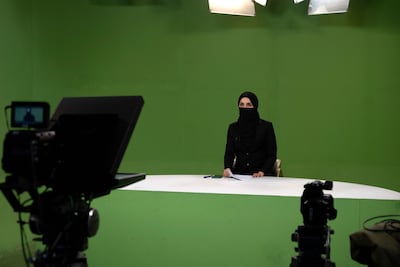Journalist Farida Sial will always remember May 22 as the day her life at Tolo News changed completely.
Members of the Taliban’s Vice and Virtue Ministry visited the news station to enforce an order announced days before that required all female TV news presenters to cover their faces while on air.
“I remember that morning,” Sial, 26, told The National. “It was such a difficult time. It was shocking and a very sad day for us.”
Afghan women defy Taliban — in pictures
The Information and Culture Ministry said the policy was “final and non-negotiable”.
“We are trying to adjust to wearing face coverings and present the news, but it is very difficult for me. It is not my choice,” Sial said.
“The Taliban is trying to remove us from public life. These orders have one aim: that women should be sitting at home.”
In an act of solidarity with their female colleagues, the channel’s male journalists and presenters, including the station’s main anchor, covered their faces with masks.
But speaking out against the regime comes with consequences. Sial said journalists could pay with their lives for complaining about the restrictions.
When the Taliban were last in power in Afghanistan from 1996-2001, they enacted harsh restrictions on women, requiring them to wear the burqa and barring them from public life.
After they seized power again in August 2021, the Taliban initially appeared to have moderated their stance.
They did not immediately announce a dress code for women and vowed to respect their rights within the norms of Islamic law.
But in recent months, the Taliban have made a sharp, hard-line turn, ordering women to wear head-to-toe clothing that leaves only their eyes visible.
The decree said they should leave the home only when necessary and that male relatives would face punishment for women’s dress code breaches.
Teenage girls have been barred from attending school.

This has left women journalists fearful they will soon be completely erased from TV screens.
“If they say we are obligated to wear a burqa, I’m sure we have lost our jobs,” Sial said.
“It is impossible being on screen wearing a burqa. This is not part of Afghan culture and also this is not part of Islam.”
She called on the international community to pressure the Taliban to guarantee women’s rights in Afghanistan.
“The US and their allies left Afghan people, especially women, in a very hard situation,” Sial said.
AP contributed to this report









